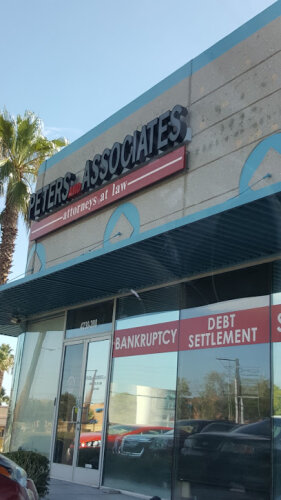Best Auto Dealer Fraud Lawyers in Las Vegas
Share your needs with us, get contacted by law firms.
Free. Takes 2 min.
List of the best lawyers in Las Vegas, United States
About Auto Dealer Fraud Law in Las Vegas, United States
Auto dealer fraud covers a range of wrongful or deceptive practices by car dealers and salespeople that induce a consumer to buy, finance, or accept a vehicle under false pretenses. In Las Vegas, as elsewhere in Nevada, these claims can be pursued under state consumer-protection laws, licensing rules that govern automobile dealers, and, in many instances, federal laws that address auto financing, odometer tampering, and advertising. Common fraudulent practices include misrepresenting a vehicle's condition or history, concealing salvage or flood damage, odometer rollback, bait-and-switch pricing, inflating financing terms or adding undisclosed fees, and selling vehicles without the proper dealer license. Remedies can be civil - such as rescission, damages, repair and replacement, or recovery of fees and attorney costs - or criminal, when conduct rises to theft, fraud, or other offenses.
Why You May Need a Lawyer
Auto dealer disputes often involve complex facts, multiple legal theories, and industry-specific regulations. You may need a lawyer if you face any of the following situations:
- The dealer misrepresented the vehicle's condition, title status, mileage, accident history, or safety defects.
- You were sold a vehicle that should qualify as a "lemon" and the dealer refused to repair, refund, or replace it after repeated attempts.
- There are title or registration irregularities, such as a missing or branded title, or you were sold a vehicle without a proper title transfer.
- You discovered odometer tampering or other clear efforts to disguise the vehicle's true mileage.
- You were pressured into unfavorable financing or the contract contains hidden charges, inflated interest, or unauthorized add-ons.
- The dealer engaged in curbstoning - operating as an unlicensed dealer - or other licensing violations.
- You have been threatened with unlawful repossession, wrongful repossession has occurred, or you face criminal accusations tied to the transaction.
- The dealer refuses to honor written warranties or extended warranties, or there is a dispute over repair obligations.
A lawyer can analyze your contract, gather and preserve evidence, advise you about statutory remedies and potential damages, negotiate with the dealer and insurers, represent you in administrative complaints to licensing authorities, and file lawsuits or criminal complaints if appropriate.
Local Laws Overview
Several local and state rules are relevant to auto dealer fraud issues in Las Vegas:
- Dealer licensing and regulation - Automobile dealers operating in Las Vegas must comply with Nevada licensing requirements, maintain required bonds and records, and follow rules about advertising and disclosures. Violations can lead to administrative sanctions, fines, or loss of license.
- Consumer protection laws - Nevada enforces consumer-protection statutes that prohibit unfair and deceptive trade practices. These laws allow consumers to seek civil remedies for misrepresentations, omissions, and other deceptive conduct in vehicle sales and finance transactions.
- Warranty and repair laws - New vehicles and some used vehicles may be protected by express warranties, implied warranties, and the state lemon law. Dealers and manufacturers must follow repair, disclosure, and refund obligations in applicable cases.
- Financing and disclosure laws - Both state and federal laws require certain disclosures for vehicle financing, such as the total cost of credit and the annual percentage rate. Improper or deceptive financing practices can be challenged under truth-in-lending rules and consumer finance protections.
- Title, odometer, and salvage rules - State and federal law prohibit odometer tampering and require accurate titles and disclosures about prior salvage, flood, or rebuilt histories. Failure to disclose such information can be the basis for fraud claims and criminal prosecution.
- Criminal statutes - In severe cases, fraudulent conduct may result in criminal charges, including theft, forgery, or fraud. Local law enforcement and prosecutors may become involved if evidence suggests criminal activity.
Frequently Asked Questions
What exactly counts as auto dealer fraud?
Auto dealer fraud occurs when a dealer intentionally misleads a buyer about material facts - for example, the vehicle's history, title status, mileage, condition, or financing terms - and the buyer reasonably relies on that misrepresentation to their detriment. Fraud can also include deliberate omissions of important facts, false advertising, or falsified paperwork.
How do I know if I have a legal claim?
If you can show that the dealer made a false statement or concealed a material fact, that you relied on that information when deciding to buy or finance the car, and that you suffered financial loss as a result, you may have a claim. A lawyer can review your contract, repair records, title history, and communications to assess legal viability.
What evidence should I collect?
Preserve all documents and communications - the sales contract, financing agreement, warranties, repair orders, vehicle history reports, emails, text messages, advertisements, buyer's guides, inspection reports, and photos of defects. Keep records of phone calls and in-person conversations, and obtain any inspection or mechanic reports that document problems.
Can I return the car and get my money back?
Returning the car depends on the facts, the contract, and applicable law. If you can prove fraud or that the vehicle is a lemon under state law, remedies can include rescission - returning the vehicle in exchange for a refund - or monetary damages. Some contracts include arbitration clauses or limit remedies, so consult a lawyer before taking action.
Does Nevada have a lemon law for used cars?
Nevada's lemon law primarily protects new vehicles, and coverage for used cars is more limited. Used car buyers may still have claims under consumer-protection laws, implied warranties if applicable, express dealer warranties, or fraud claims if the dealer misrepresented the vehicle. A lawyer can determine which legal path fits your situation.
What administrative actions can I take before suing?
You can file complaints with the Nevada Department of Motor Vehicles - dealer licensing unit - and with the Nevada Attorney General's Consumer Protection Division. These agencies can investigate licensing violations, mediate disputes, and sometimes obtain remedies. Filing an administrative complaint does not prevent you from pursuing a private lawsuit.
Can my case lead to criminal charges?
Yes. If the dealer's conduct amounts to theft, forgery, or intentional fraud, local prosecutors may bring criminal charges. Criminal proceedings are separate from civil claims. If you suspect criminal conduct, provide evidence to local law enforcement or the county district attorney's office; a lawyer can help you present the case to authorities.
How long do I have to file a claim?
Time limits - statutes of limitations - apply to fraud and other claims. The length of time you have to file depends on the type of claim and when you discovered the fraud. Because deadlines can be strict, do not delay in contacting a lawyer to preserve your rights.
Will I have to pay legal fees if I sue?
Many consumer-protection statutes allow recovery of attorney fees and costs if you win. Some lawyers handle consumer fraud and auto dealer cases on a contingency-fee basis - meaning they are paid a percentage of any recovery - which can reduce upfront costs. Ask about fee arrangements and possible costs at your first consultation.
What are common remedies if I win?
Remedies can include rescission of the sale, refund of the purchase price, repair costs, diminution in value, consequential damages, statutory penalties, restitution, and attorney fees. In cases of particularly egregious conduct, punitive damages may be awarded. The exact remedies depend on the claims and the evidence.
Additional Resources
When dealing with suspected auto dealer fraud in Las Vegas, the following resources can be helpful to gather information, file complaints, or get referrals to legal help:
- Nevada Department of Motor Vehicles - dealer licensing and complaints related to licensed dealers and dealer conduct.
- Nevada Attorney General - Consumer Protection Division - handles consumer complaints and enforces state consumer-protection laws.
- Local law enforcement and the Clark County District Attorney - for suspected criminal fraud or theft.
- Nevada State Bar - lawyer referral services and information on finding an attorney experienced in consumer protection and auto dealer disputes.
- Federal agencies that may be relevant depending on the issue - for example, agencies that handle financing, odometer tampering, or safety recall information.
- Consumer advocacy organizations and local legal aid programs that may provide guidance or representation for eligible consumers.
Next Steps
If you suspect you have been the victim of auto dealer fraud, take these steps promptly:
- Stop using the vehicle only if continued use will cause additional damage or affect evidence. Otherwise, preserve the vehicle in its current condition and document defects with photos.
- Collect and organize all documents and communications related to the sale, financing, repairs, and any representations made by the dealer or salesperson.
- Request written explanations from the dealer about the issues you discovered and keep a copy of their response or refusal.
- Obtain independent inspections or mechanic reports that document defects, repairs, or evidence of tampering such as odometer inconsistencies or hidden damage.
- File complaints with relevant agencies - the Nevada DMV for dealer licensing issues and the Nevada Attorney General for consumer-protection complaints - and notify local law enforcement if you suspect criminal conduct.
- Contact an attorney who handles auto dealer fraud and consumer protection for a case evaluation. Ask about contingency fees, likely remedies, and the best legal strategy - negotiation, administrative action, mediation, arbitration, or litigation.
- Be mindful of deadlines - statutes of limitations and any contractual notice or arbitration requirements - and act quickly to preserve your rights.
Working with an experienced lawyer will help you understand your legal options, preserve evidence, and pursue the best path to recovery, whether through negotiation, administrative enforcement, or court action.
Lawzana helps you find the best lawyers and law firms in Las Vegas through a curated and pre-screened list of qualified legal professionals. Our platform offers rankings and detailed profiles of attorneys and law firms, allowing you to compare based on practice areas, including Auto Dealer Fraud, experience, and client feedback.
Each profile includes a description of the firm's areas of practice, client reviews, team members and partners, year of establishment, spoken languages, office locations, contact information, social media presence, and any published articles or resources. Most firms on our platform speak English and are experienced in both local and international legal matters.
Get a quote from top-rated law firms in Las Vegas, United States — quickly, securely, and without unnecessary hassle.
Disclaimer:
The information provided on this page is for general informational purposes only and does not constitute legal advice. While we strive to ensure the accuracy and relevance of the content, legal information may change over time, and interpretations of the law can vary. You should always consult with a qualified legal professional for advice specific to your situation.
We disclaim all liability for actions taken or not taken based on the content of this page. If you believe any information is incorrect or outdated, please contact us, and we will review and update it where appropriate.









